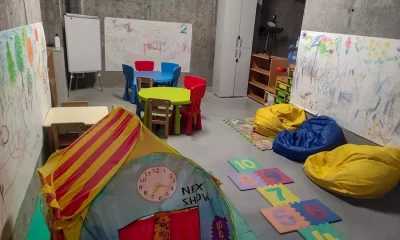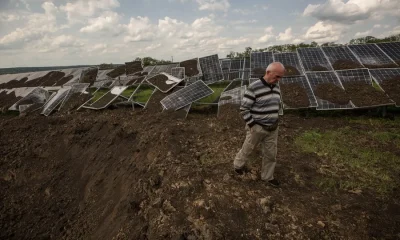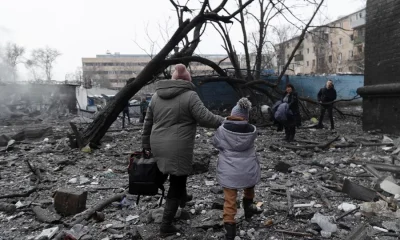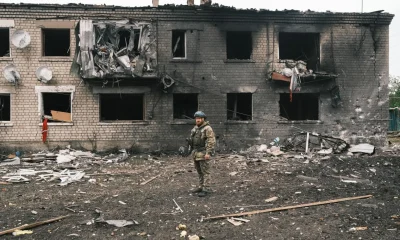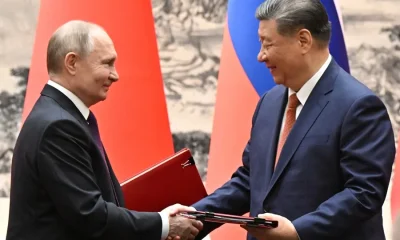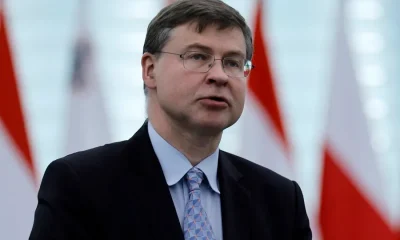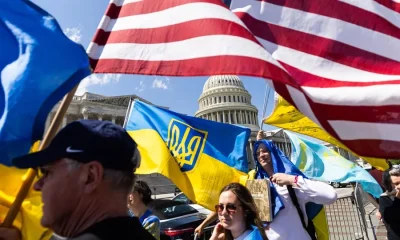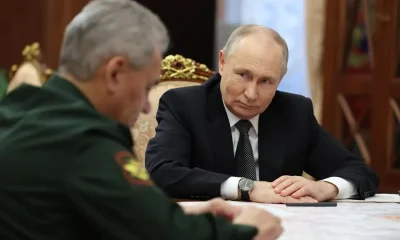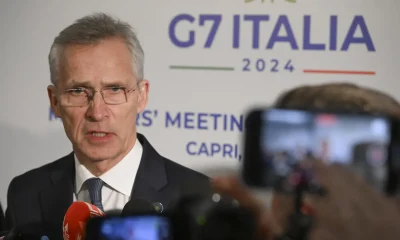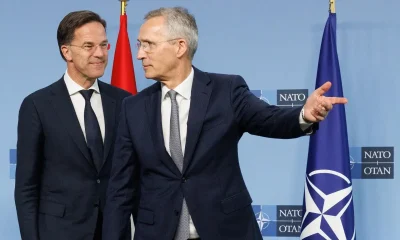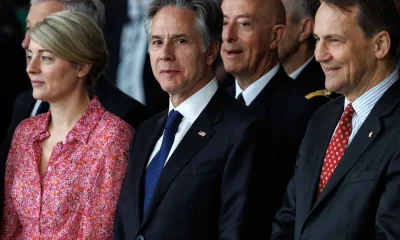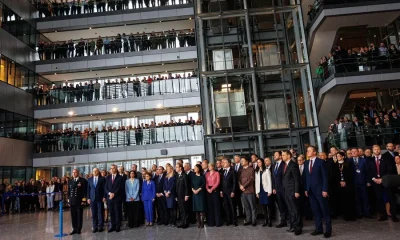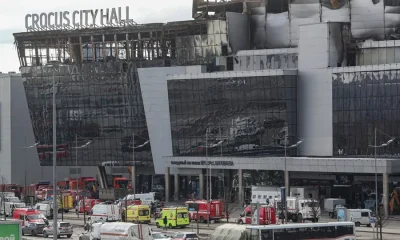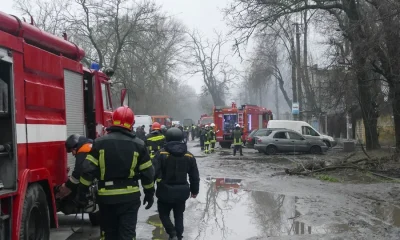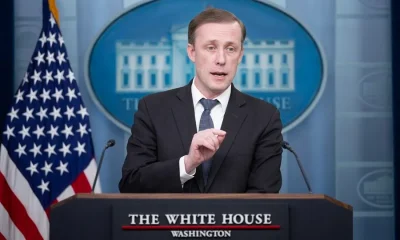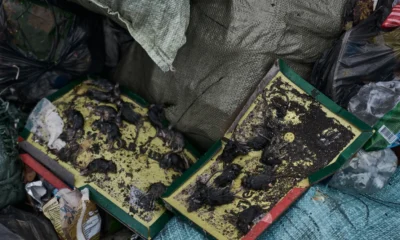International
Ukraine announces the dismantling of a subversive group that wanted to take Parliament

The Security Service of Ukraine (SBU) announced today the dismantling of a subversive group that had called a public event in the capital with the aim of overthrowing the Ukrainian civil and military authorities and taking the Supreme Rada building (Parliament).
An indeterminate number of people have been arrested for their participation in the conspiracy, according to the SBU.
“According to the investigation, in May and June 2024 a group of people distributed messages on social networks discrediting the current leadership of the State, calling for changes in the constitutional order and the seizure of power in Ukraine2, reads a statement from the Ukrainian Prosecutor’s Office, which has also reported the dismantling of the group.
According to the Prosecutor’s Office, the leaders of the group had called various public events for June 30, when Ukraine celebrates Constitution Day. The organizers did not reveal their coup intentions in the calls.
In addition to taking Parliament, the idea of these supposed subversives was to elect a new “interim government” in these public acts.
The main organizer of the event is, according to the Prosecutor’s Office, the leader of an organization that “has experience in participating in provocative acts that have not yielded results.” The Prosecutor’s Office does not provide more details about the identity of this person or about the organization he leads.
“He had rented a room with capacity for two thousand people and had also sought military personnel and armed guards from private structures to carry out the seizure of power,” says the Prosecutor’s Office about how he prepared the alleged attempt.
According to this source, the organizer had accomplices in the regions of Dnipropetrovsk (center) and Kiev and had tried unsuccessfully to attract an oenegé from the Ivano-Frankivsk region (west) to the preparations.
Four people are being investigated in Ivano-Frankivsk for distributing material with calls for the violent overthrow of constitutional order in Ukraine. Two of them are deprived of liberty on a preventive basis, according to the Prosecutor’s Office.
On the other hand, Russia expressed its concern about the concentration of Ukrainian troops next to the Belarusian border, denounced by the Belarusian military command.
“This causes concern not only in Minsk, but also in Moscow. Well, we are really partners and allies,” Kremlin spokesman Dmitri Peskov said at his daily telephone press conference.
The president of Ukraine, Volodymyr Zelensky, for his part, asked in his speech to the nation last night for more “bold decisions” from his Western allies to reduce Russian airstrikes such as the one that on Sunday killed one person and injured ten others in the city of Kharkov.
Ukraine has repeatedly asked in recent weeks for more freedom of action to use Western weapons against targets within the Russian Federation to neutralize at the origin of Russian attacks from the other side of the border. One of Kiev’s claims is that it is allowed to use long-range missiles to destroy planes on Russian airfields.
Last month, the United States and other Kiev partners allowed Ukraine to attack military infrastructures located in Russian territory near the border that Russia uses to attack regions such as Kharkov, in northeastern Ukraine.
Ukraine asks its allies for long-range missiles to attack air bases within Russia, and more Patriot systems and other types of longer-range missile systems to keep enemy planes that launch these bombs away from their targets.
On the other hand, Russian anti-aircraft defense systems shot down a total of 18 Ukrainian fixed-winged drones last night over the Kursk and Belgorod regions, both bordering Ukraine, the Russian Ministry of Defense reported on Monday on its Telegram channel.
In addition, the Russian Army took two Ukrainian localities in the Kharkov and Donetsk regions, in the east of the country, as reported by the Russian Ministry of Defense in its daily war report.
International
Thousands rally nationwide against Trump’s threat to U.S. democracy

Thousands of protesters gathered on Saturday (April 19, 2025) in major cities like New York and Washington, as well as in small communities across the United States, in a second wave of demonstrations against President Donald Trump. The crowds denounced what they view as growing threats to the country’s democratic ideals.
In New York City, demonstrators of all ages rallied in front of the Public Library near Trump Tower, holding signs accusing the president of undermining democratic institutions and judicial independence.
Many protesters also criticized Trump’s hardline immigration policies, including mass deportations and raids targeting undocumented migrants.
“Democracy is in grave danger,” said Kathy Valyi, 73, the daughter of Holocaust survivors. She told AFP that the stories her parents shared about Adolf Hitler’s rise to power in 1930s Germany “are happening here now.”
In Washington, demonstrators voiced concern over what they see as Trump’s disregard for long-standing constitutional norms, such as the right to due process.
International
ACLU seeks emergency court order to stop venezuelan deportations under Wartime Law

The American Civil Liberties Union (ACLU) on Friday asked two federal judges to block the U.S. government under President Donald Trump from deporting any Venezuelan nationals detained in North Texas under a rarely used 18th-century wartime law, arguing that immigration officials appear to be moving forward with deportations despite Supreme Court-imposed limitations.
The ACLU has already filed lawsuits to stop the deportation of two Venezuelan men held at the Bluebonnet Detention Center, challenging the application of the Alien Enemies Act of 1798. The organization is now seeking a broader court order that would prevent the deportation of any immigrant in the region under that law.
In an emergency filing early Friday, the ACLU warned that immigration authorities were accusing other Venezuelan detainees of being members of the Tren de Aragua, a transnational criminal gang. These accusations, the ACLU argues, are being used to justify deportations under the wartime statute.
The Alien Enemies Act has only been invoked three times in U.S. history — most notably during World War II to detain Japanese-American civilians in internment camps. The Trump administration has claimed the law allows them to swiftly remove individuals identified as gang members, regardless of their immigration status.
The ACLU, together with Democracy Forward, filed legal actions aiming to suspend all deportations carried out under the law. Although the U.S. Supreme Court recently allowed deportations to resume, it unanimously ruled that they could only proceed if detainees are given a chance to present their cases in court and are granted “a reasonable amount of time” to challenge their pending removal.
International
Dominican ‘False Hero’ Arrested for Faking Role in Nightclub Collapse That Killed 231

A man identified as Rafael Rosario Mota falsely claimed to have rescued 12 people from the collapse of the Jet Set nightclub in Santo Domingo—a tragedy that left 231 people dead—but he was never at the scene.
Intelligence agents in the Dominican Republic arrested the 32-year-old man for pretending to be a hero who saved lives during the catastrophic incident, authorities announced.
Rosario Mota had been charging for media interviews in which he falsely claimed to have pulled survivors from the rubble after the nightclub’s roof collapsed in the early hours of April 8, during a concert by merengue singer Rubby Pérez, who was among those killed.
“He was never at the scene of the tragedy,” the police stated. The arrest took place just after he finished another interview on a digital platform, where he repeated his fabricated story in exchange for money as part of a “media tour” filled with manipulated information and invented testimonies.
“False hero!” read a message shared on the police force’s Instagram account alongside a short video of the suspect, in which he apologized: “I did it because I was paid. I ask forgiveness from the public and the authorities.”
-

 Central America5 days ago
Central America5 days agoPetro questions Ecuador’s vote, cites reports of military control and arrests
-

 International4 days ago
International4 days agoArsenal stun Real Madrid at the Bernabéu to reach Champions League semifinals
-

 International3 days ago
International3 days agoDominican ‘False Hero’ Arrested for Faking Role in Nightclub Collapse That Killed 231
-

 Central America3 days ago
Central America3 days agoNicaraguan Exiles to Mark 7th Anniversary of 2018 Protests with Global Commemorations
-

 International4 days ago
International4 days agoBogotá residents line up for yellow fever vaccine amid national alert
-

 International2 days ago
International2 days agoACLU seeks emergency court order to stop venezuelan deportations under Wartime Law
-

 International4 days ago
International4 days agoDeSantis’ immigration crackdown sparks alarm in Venezuelan Communities in Doral
-

 Central America2 days ago
Central America2 days agoUN complaint filed against Costa Rica over detention of migrant children
-

 International4 days ago
International4 days agoMexico refuses to restore ties with Ecuador while Noboa remains in office
-

 International15 hours ago
International15 hours agoThousands rally nationwide against Trump’s threat to U.S. democracy
-

 International5 days ago
International5 days agoColombia: Search continues for missing limb of italian scientist found dismembered


















